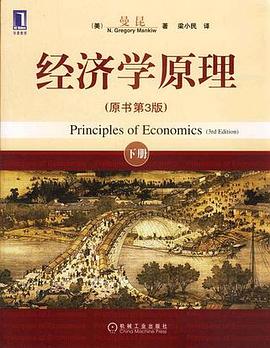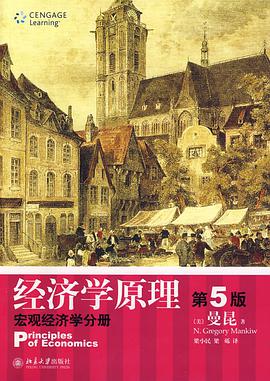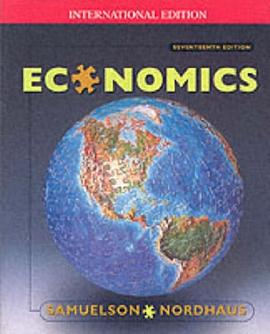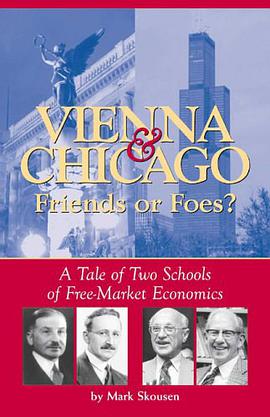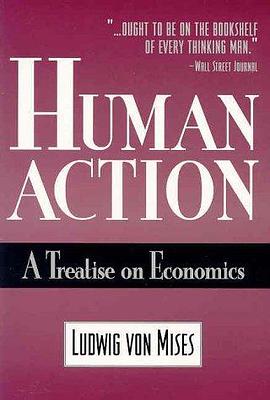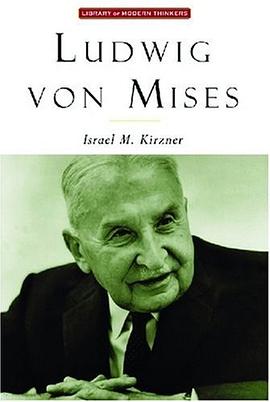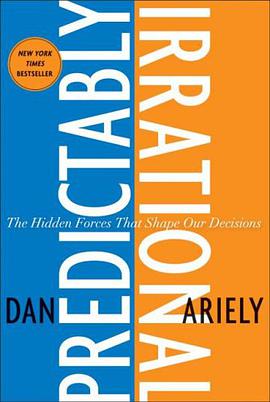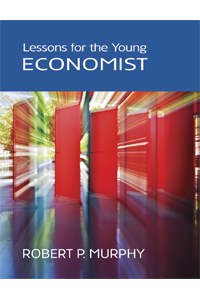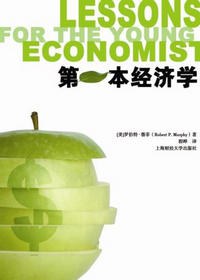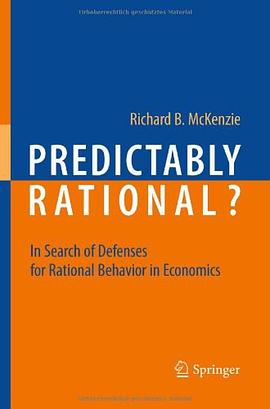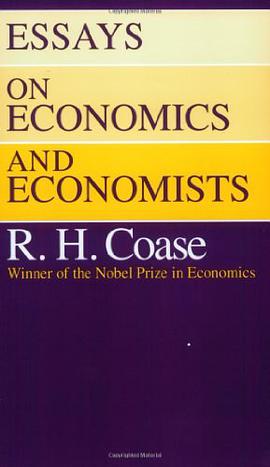經濟學
经济学原理 豆瓣
9.1 (62 个评分)
作者:
[美] N·格里高利·曼昆
译者:
梁小民
/
梁砾
北京大学出版社
2009
- 4
《经济学原理(第5版):微观经济学分册》是世界上最流行的经济学教材!其英文原版现已被哈佛大学、耶鲁大学、斯坦福大学等美国600余所大学用作经济学原理课程的教材迄今为止它已被翻译成20种语言在全世界销售100多万册!《经济学原理(第5版):微观经济学分册》前四版的中译本自1999年出版以来也一直是国内选用最多、最受欢迎的经济学教材!在继续保持条理清晰、易于理解的写作风格基础上,曼昆教授在第5版中对全书36章都做了精心修订;同时也更新了大部分“新闻摘录”和部分“案例研究”;此外,为帮助教师进行课堂设计和课堂讲解,本版还极大地丰富了教辅资源。
经济学原理 豆瓣
9.0 (24 个评分)
作者:
[美] N·格里高利·曼昆
译者:
梁小民
/
梁砾
北京大学出版社
2009
- 4
《经济学原理(第5版):宏观经济学分册》是世界上最流行的经济学教材!其英文原版现已被哈佛大学、耶鲁大学、斯坦福大学等美国600余所大学用作经济学原理课程的教材迄今为止它已被翻译成20种语言在全世界销售100多万册!《经济学原理(第5版):宏观经济学分册》前四版的中译本自1999年出版以来也一直是国内选用最多、最受欢迎的经济学教材!在继续保持条理清晰、易于理解的写作风格基础上,曼昆教授在第5版中对全书36章都做了精心修订;同时也更新了大部分“新闻摘录”和部分“案例研究”;此外,为帮助教师进行课堂设计和课堂讲解,本版还极大地丰富了教辅资源。
点击链接进入英文版:
Principles of Economics
点击链接进入:
经济学原理:宏观经济学分册(第6版)
海报:
点击链接进入英文版:
Principles of Economics
点击链接进入:
经济学原理:宏观经济学分册(第6版)
海报:
怪诞行为学 豆瓣 Goodreads
Predictably Irrational: The Hidden Forces That Shape Our Decisions
7.8 (55 个评分)
作者:
[美] 丹·艾瑞里
译者:
赵德亮
/
夏蓓洁
中信出版社
2008
- 10
生活中我们常有莫名其妙的举动。你真的会失控?一时冲动就是没道理可言?本书作者丹·艾瑞里告诉你:错!所有的现象,背后都有经济的力量!社会当实验室,真人做小白鼠,丹·艾瑞里的这本《怪诞行为学》一语道破,用轻松幽默的方式告诉我们这是为什么,又该如何改变。他比别的所有经济学家都更好地揭示、解释了我们不可思议的行为背后的原因。
Die Wirtschaft der Gesellschaft 豆瓣
作者:
Niklas Luhmann
Suhrkamp Verlag
1994
- 9
Economics (McGraw-Hill International Editions) 豆瓣
作者:
Paul A. Samuelson
/
William D. Nordhaus
McGraw-Hill Education (ISE Editions)
2001
- 1
Grundzüge der Volkswirtschaftslehre 豆瓣
作者:
N. Gregory Mankiw
/
Mark P. Taylor
Schäffer-Poeschel
2008
- 8
Vienna & Chicago, Friends or Foes? 豆瓣
作者:
Mark Skousen
Capital Press
2005
- 7
In his new book, "Vienna and Chicago, Friends or Foes?" economist and author Mark Skousen debates the Austrian and Chicago schools of free-market economics, two schools in constant, heated disagreement in their theories of money, business cycle, government policy, and methodology.
为什么中国人勤劳而不富有 豆瓣
7.2 (5 个评分)
作者:
[美国] 陈志武
中信出版社
2008
- 10
今天的世界里,勤劳是否还是财富与收入的决定性因素?是否还“勤劳致富”?如果不是勤劳,那又是什么呢?——不管对穷人还是富人,不管对过去人还是现代人,只要进取心是人之本性,财富话题总会令人着迷,也永远会令人着迷。
~~~~~~~~~~~~~~~~~~~~~~~~~~~~~~~~~~~~~~
比较一下各国的贫富悬殊现状才发现,原来“地大物博”、物资丰富只能给一个国家提供优质的“先前条件”,但这些并不是“先决条件”。经验说明,一个国家更重要的财富是其能促进财富创造的制度机制及与其相配套的自由金融创新体系,这种制度财富是无形的,但它比有形的“地大物博”更重要、更“值钱”。
金融创新之所以对个人消费者很关键,是因为这些创新可以帮助解放居民的消费潜力,调动经济增长的原动力。而同时,产权保护和其他制度机制的作用为创业者以及财富拥有者提供了正面的激励,为进一步投资增长提供稳定的预期。足够的金融证券品种帮助社会大众规避风险、调配不同时候的收入。
中国拥有世界上最多、也相对很廉价的劳动力,这种劳动力优势在经济增长初期可以弥补、对冲高制度成本对中国经济的负面影响。怎样让每个居民从增加的人力资本感到“富有”呢?那就得通过金融创新来帮助老百姓把人力资本“兑现”、把他们未来的收入流进一步“证券化”。
~~~~~~~~~~~~~~~~~~~~~~~~~~~~~~~~~~~~~~
比较一下各国的贫富悬殊现状才发现,原来“地大物博”、物资丰富只能给一个国家提供优质的“先前条件”,但这些并不是“先决条件”。经验说明,一个国家更重要的财富是其能促进财富创造的制度机制及与其相配套的自由金融创新体系,这种制度财富是无形的,但它比有形的“地大物博”更重要、更“值钱”。
金融创新之所以对个人消费者很关键,是因为这些创新可以帮助解放居民的消费潜力,调动经济增长的原动力。而同时,产权保护和其他制度机制的作用为创业者以及财富拥有者提供了正面的激励,为进一步投资增长提供稳定的预期。足够的金融证券品种帮助社会大众规避风险、调配不同时候的收入。
中国拥有世界上最多、也相对很廉价的劳动力,这种劳动力优势在经济增长初期可以弥补、对冲高制度成本对中国经济的负面影响。怎样让每个居民从增加的人力资本感到“富有”呢?那就得通过金融创新来帮助老百姓把人力资本“兑现”、把他们未来的收入流进一步“证券化”。
Human Action 豆瓣
作者:
Ludwig von Mises
Fox & Wilkes
1996
- 7
Ludwig Von Mises 豆瓣
作者:
Israel M. Kirzner
Intercollegiate Studies Institute
2001
- 6
Predictably Irrational 豆瓣
7.5 (8 个评分)
作者:
Dan Ariely
Harper Collins
2008
From Publishers Weekly
Irrational behavior is a part of human nature, but as MIT professor Ariely has discovered in 20 years of researching behavioral economics, people tend to behave irrationally in a predictable fashion. Drawing on psychology and economics, behavioral economics can show us why cautious people make poor decisions about sex when aroused, why patients get greater relief from a more expensive drug over its cheaper counterpart and why honest people may steal office supplies or communal food, but not money. According to Ariely, our understanding of economics, now based on the assumption of a rational subject, should, in fact, be based on our systematic, unsurprising irrationality. Ariely argues that greater understanding of previously ignored or misunderstood forces (emotions, relativity and social norms) that influence our economic behavior brings a variety of opportunities for reexamining individual motivation and consumer choice, as well as economic and educational policy. Ariely's intelligent, exuberant style and thought-provoking arguments make for a fascinating, eye-opening read. (Feb.)
Copyright © Reed Business Information, a division of Reed Elsevier Inc. All rights reserved.
Irrational behavior is a part of human nature, but as MIT professor Ariely has discovered in 20 years of researching behavioral economics, people tend to behave irrationally in a predictable fashion. Drawing on psychology and economics, behavioral economics can show us why cautious people make poor decisions about sex when aroused, why patients get greater relief from a more expensive drug over its cheaper counterpart and why honest people may steal office supplies or communal food, but not money. According to Ariely, our understanding of economics, now based on the assumption of a rational subject, should, in fact, be based on our systematic, unsurprising irrationality. Ariely argues that greater understanding of previously ignored or misunderstood forces (emotions, relativity and social norms) that influence our economic behavior brings a variety of opportunities for reexamining individual motivation and consumer choice, as well as economic and educational policy. Ariely's intelligent, exuberant style and thought-provoking arguments make for a fascinating, eye-opening read. (Feb.)
Copyright © Reed Business Information, a division of Reed Elsevier Inc. All rights reserved.
Lessons for the Young Economist 豆瓣
作者:
Murphy, Robert P.
Ludwig von Mises Institute
2010
- 10
We are beyond mere excitement about Lessons for the Young Economist. It is easily the best introduction to economics for the young reader—because it covers both pure economic theory and also how markets work (the domain of most introductory books).
Robert Murphy has the right frame of mind and mastery of the subject matter to provide the best possible pedagogy. The logic is super clear. The organization is impeccable. It achieves a great balance between “plain old” economics and that aspect of economic thought that is considered particularly Austrian. Therefore, it prepares the student for both conventional economic studies in the future and provides the logical rigor and policy clarity that only the Austrian School perspective can offer.
Most of the attempts at such texts falter because they are either too dry and technical for the young reader or they are littered with attempts to keep the student entertained with references to pop culture or cheesy passages that attempt to “speak the child’s language” but only end up sounding patronizing.
Dr. Murphy’s text has none of this. The prose has relentless fire without needless fireworks. What drives it forward is intellectual passion born of his love of the topic. What’s also nice is that he is nowhere self-consciously trying to sound like someone he is not. It is his real voice, explaining everything point by point. For this reason, the text is warm and engaging.
Here is the product of vast experience and daily writing. This permits the voicing of the book to achieve a remarkable integration page to page, chapter to chapter. Though he is drawing from the whole history of the development of economics, the text ends up being strikingly original. His approach is not based on anything but his own sense of how to teach this subject.
This book will not be boring or useless even for people who think they already know the subject. Every page or two, there are fresh insights. For example, on the problems with barter, he shows that in the real world, most goods and services would not have come into existence at all (so that there would be no trading of tractors for cobbler services because there would be no tractors or repairable shoes). In another place, he points out that one of the advantages of the division of labor is that it makes the advantages of automation more readily apparent.
Maybe these points appear in other introductory texts but the way he works them into a logical and seamless system is very impressive. It has a much larger market than just high-school students. Anyone can enjoy this book and learn from it. The appropriate age here is probably 13 and up but any adult will love this book.
Murphy wrote the first study guides to Human Action and Man, Economy, and State. He can now add another medal to his chest. It is a big one. There is every reason to believe that this book will still have powerful legs decades from now.
As for the price, it is close to being a miracle for a textbook of this size and expanse. The conventional publishers of bad books at high prices don't stand a chance against this landmark.
Robert Murphy has the right frame of mind and mastery of the subject matter to provide the best possible pedagogy. The logic is super clear. The organization is impeccable. It achieves a great balance between “plain old” economics and that aspect of economic thought that is considered particularly Austrian. Therefore, it prepares the student for both conventional economic studies in the future and provides the logical rigor and policy clarity that only the Austrian School perspective can offer.
Most of the attempts at such texts falter because they are either too dry and technical for the young reader or they are littered with attempts to keep the student entertained with references to pop culture or cheesy passages that attempt to “speak the child’s language” but only end up sounding patronizing.
Dr. Murphy’s text has none of this. The prose has relentless fire without needless fireworks. What drives it forward is intellectual passion born of his love of the topic. What’s also nice is that he is nowhere self-consciously trying to sound like someone he is not. It is his real voice, explaining everything point by point. For this reason, the text is warm and engaging.
Here is the product of vast experience and daily writing. This permits the voicing of the book to achieve a remarkable integration page to page, chapter to chapter. Though he is drawing from the whole history of the development of economics, the text ends up being strikingly original. His approach is not based on anything but his own sense of how to teach this subject.
This book will not be boring or useless even for people who think they already know the subject. Every page or two, there are fresh insights. For example, on the problems with barter, he shows that in the real world, most goods and services would not have come into existence at all (so that there would be no trading of tractors for cobbler services because there would be no tractors or repairable shoes). In another place, he points out that one of the advantages of the division of labor is that it makes the advantages of automation more readily apparent.
Maybe these points appear in other introductory texts but the way he works them into a logical and seamless system is very impressive. It has a much larger market than just high-school students. Anyone can enjoy this book and learn from it. The appropriate age here is probably 13 and up but any adult will love this book.
Murphy wrote the first study guides to Human Action and Man, Economy, and State. He can now add another medal to his chest. It is a big one. There is every reason to believe that this book will still have powerful legs decades from now.
As for the price, it is close to being a miracle for a textbook of this size and expanse. The conventional publishers of bad books at high prices don't stand a chance against this landmark.
Predictably Rational? 豆瓣
作者:
Richard B. McKenzie
Springer
2009
- 11
身份与暴力 豆瓣
Identity and Violence
7.8 (12 个评分)
作者:
[印度] 阿马蒂亚·森
译者:
李风华
中国人民大学出版社
2009
世界也许充斥着越来越多的暴力,但是诺贝尔奖得主阿马蒂亚•森在这部包罗万象的哲学著作中认为,驱使着这些暴行的,不仅仅是那些不可解脱的仇恨,还有人们的思想混乱。
在11岁那年,阿马蒂亚•森生平第一次亲历了杀戮。20世纪40年代在印度突然爆发的印度教徒—穆斯林骚乱的双方都是受到了别人的有意挑唆。这场骚乱中的绝大多数受害者——包括印度教徒与穆斯林——都是同属一个阶级的劳动人民。然而应当对这场血腥屠杀负……
本文来自: 中国经济学教育科研网(http://www.cenet.org.cn) 详细内容清查看:http://www.cenet.org.cn/article.asp?articleid=39161
在11岁那年,阿马蒂亚•森生平第一次亲历了杀戮。20世纪40年代在印度突然爆发的印度教徒—穆斯林骚乱的双方都是受到了别人的有意挑唆。这场骚乱中的绝大多数受害者——包括印度教徒与穆斯林——都是同属一个阶级的劳动人民。然而应当对这场血腥屠杀负……
本文来自: 中国经济学教育科研网(http://www.cenet.org.cn) 详细内容清查看:http://www.cenet.org.cn/article.asp?articleid=39161
Essays on Economics and Economists 豆瓣
作者:
R. H. Coase
University of Chicago Press
1995
- 9
How do economists decide what questions to address and how to choose their theories? How do they tackle the problems of the economic system and give advice on public policy? With these questions, Nobel laureate R.H. Coase reflects on some of the most fundamental concerns of economists over the past two centuries. In 15 essays, he evaluates the contributions of a number of figures, including Adam Smith, Alfred Marshall, Arnold Plant, Duncan Black, and George Stigler, as well as economists at the London School of Economics in the 1930s.

